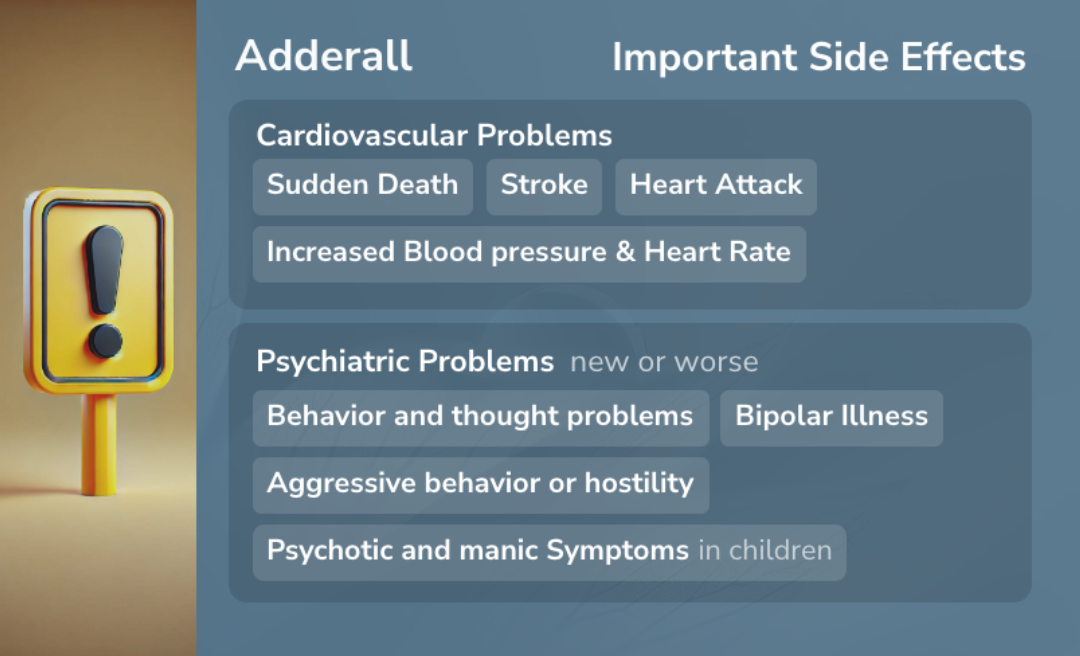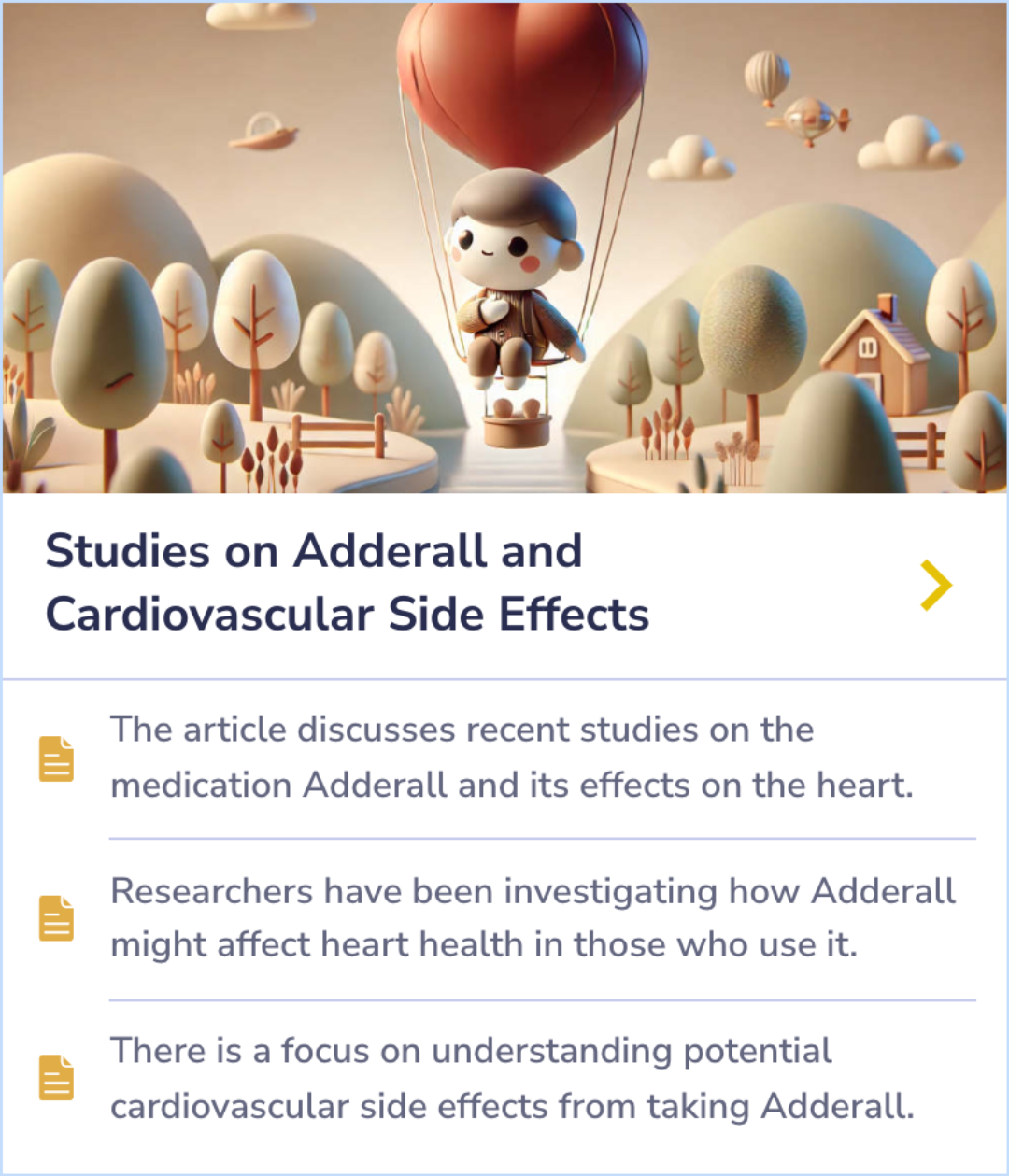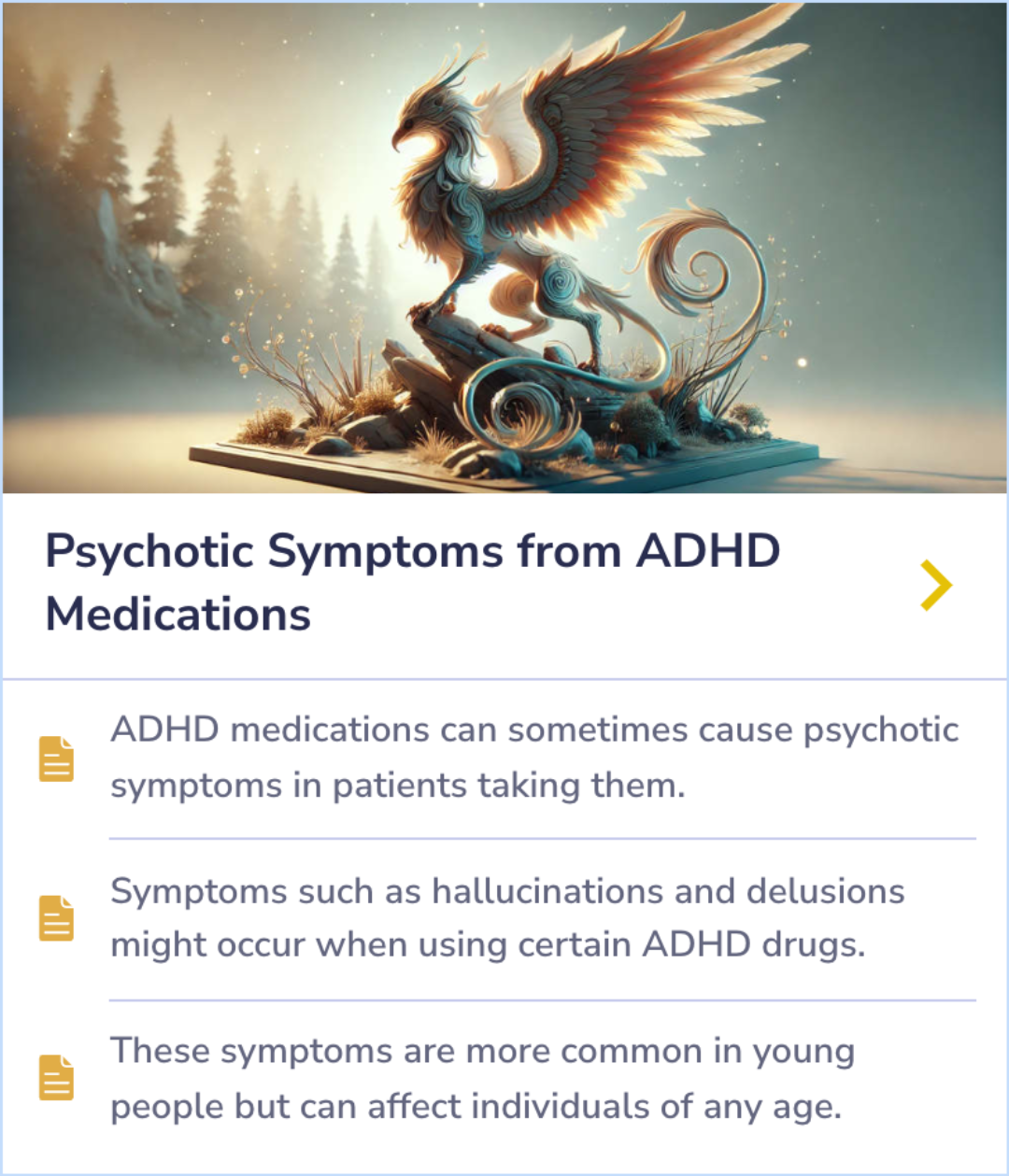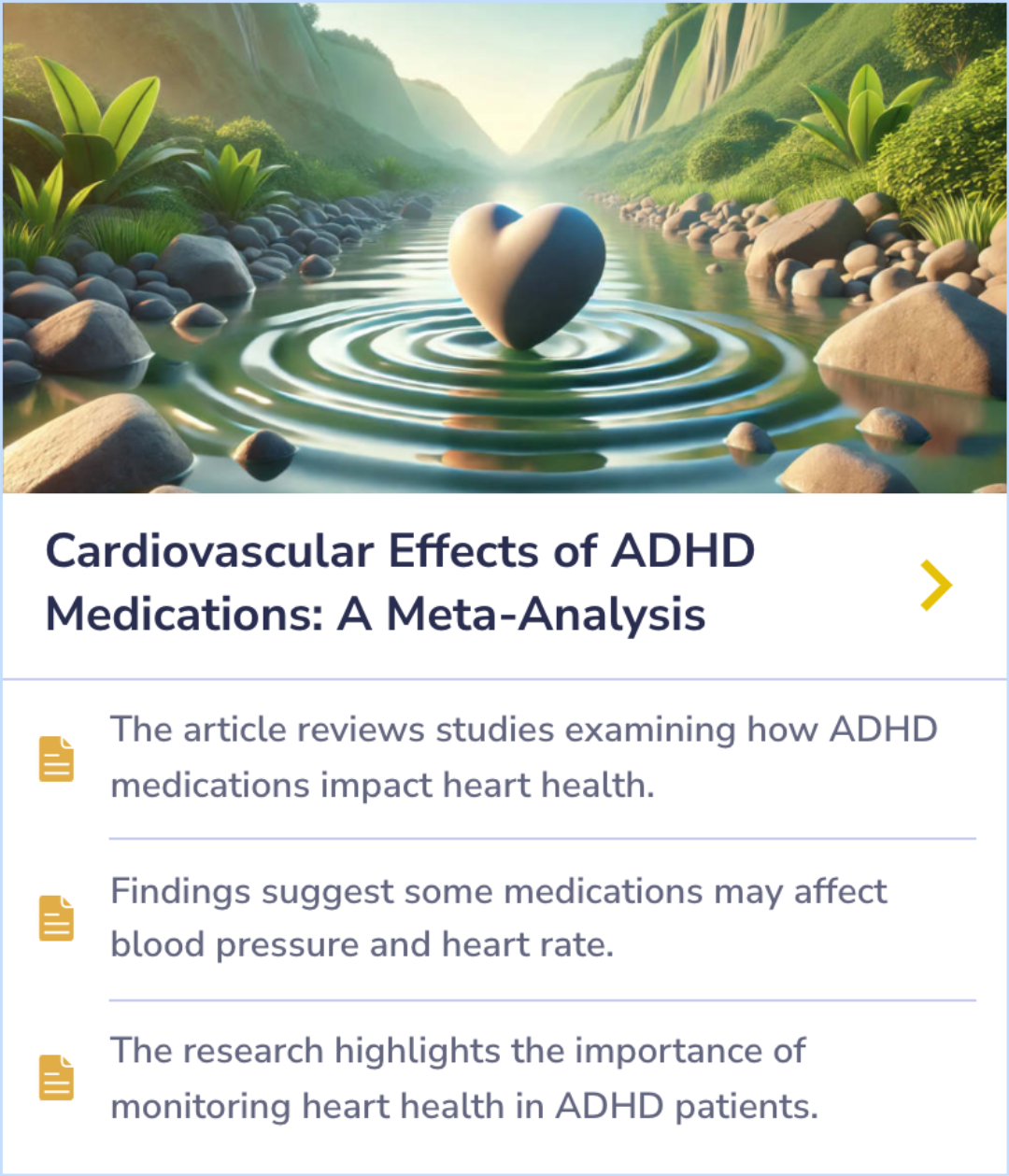Adderall
Evidence Based Answers
Cardiovascular and Psychiatric Risks of Adderall
Adderall can increase heart rate and blood pressure, posing risks for cardiovascular events, especially in those with heart conditions. It may also lead to psychiatric effects like mania and aggression, notably impacting children and adolescents.

Adderall can affect the heart and psyche, causing heart rate spikes and aggression.
Cardiovascular Risks of Adderall
Adderall can raise blood pressure and heart rate, even at regular doses. It has been linked to severe cardiovascular events like heart attacks and strokes, though these are rare. Patients with existing heart conditions may be more at risk.
Caution is advised when prescribing Adderall to people with a history of heart problems, as it can worsen these conditions.
Caution is advised when prescribing Adderall to people with a history of heart problems, as it can worsen these conditions.
“
Source Quotes:
Sudden deaths, stroke, and myocardial infarction have been reported in adults taking stimulant drugs at usual doses for ADHD.,Stimulant medications cause a modest increase in average blood pressure (about 2 to 4 mmHg) and average heart rate (about 3 to 6 bpm).
The association between amphetamine and severe cardiovascular events is controversial.
Psychiatric Adverse Effects
Adderall may cause psychiatric side effects, including mania, hallucinations, and delusions, especially in people with a history of mental health disorders like bipolar disorder. These symptoms can also appear in those with no previous psychiatric issues.
Increased irritability, anxiety, and aggressive behavior are also common, particularly in children and adolescents.
Increased irritability, anxiety, and aggressive behavior are also common, particularly in children and adolescents.
“
Source Quotes:
Emergence of New Psychotic or Manic Symptoms Treatment emergent psychotic or manic symptoms, e.g., hallucinations, delusional thinking, or mania in children and adolescents without prior history of psychotic illness or mania can be caused by stimulants at usual doses.,Particular care should be taken in using stimulants to treat ADHD patients with comorbid bipolar disorder because of concern for possible induction of mixed/manic episode in such patients.
High doses of amphetamines can produce psychotic behavior indistinguishable from schizophrenia in asymptomatic schizophrenics and in some healthy human subjects.
Behavioral Side Effects and Hostility
Adderall use may lead to aggression, hostility, and irritability, especially in children and adolescents. These behaviors have been noted in patients with no prior history of aggression.
These side effects should be monitored during treatment, as they may worsen over time or emerge unexpectedly.
These side effects should be monitored during treatment, as they may worsen over time or emerge unexpectedly.
“
Source Quotes:
Aggressive behavior or hostility is often observed in children and adolescents with ADHD, and has been reported in clinical trials and the postmarketing experience of some medications indicated for the treatment of ADHD.,Patients beginning treatment for ADHD should be monitored for the appearance of or worsening of aggressive behavior or hostility.
The severity of adverse events may be greater for amphetamine, especially with respect to insomnia, negative affect, irritability, proneness to crying, anxiety, sadness/unhappiness, and nightmares.
Potential for Abuse and Dependence
Adderall has a risk of abuse, particularly at higher doses. This can lead to addiction and other harmful behaviors.
Given these risks, Adderall is regulated carefully, and healthcare providers must weigh the potential for misuse when prescribing it, especially for those with a history of substance use disorders.
Given these risks, Adderall is regulated carefully, and healthcare providers must weigh the potential for misuse when prescribing it, especially for those with a history of substance use disorders.
“
Source Quotes:
However, a pleasurable experience from d-amphetamine can lead to excessive use of it as a prescribed drug by the patient and the (mis)use of the prescription by others (diversion).,The intravenous use of d-amphetamine and other stimulants still pose major safety risks to the individuals indulging in this practice.
Common signs and symptoms of acute amphetamine intoxication include hypertension, tachycardia, tachypnea, hyperthermia, mydriasis, tremors, agitation, and psychosis.
Key Takeaways
Conclusions
Adderall, while effective for some, poses notable cardiovascular risks, including elevated blood pressure and heart rate. There is a rare chance of severe heart incidents like strokes or heart attacks, especially in individuals with pre-existing conditions.
On the psychiatric front, Adderall can cause significant behavioral changes such as mania, delusions, and increased aggression and anxiety. These effects are more pronounced in children and adolescents and may emerge unexpectedly in those with or without mental health history.
The potential for abuse and dependence associated with Adderall underscores the necessity of thorough evaluation and caution by healthcare providers, especially in those with a history of substance abuse.
On the psychiatric front, Adderall can cause significant behavioral changes such as mania, delusions, and increased aggression and anxiety. These effects are more pronounced in children and adolescents and may emerge unexpectedly in those with or without mental health history.
The potential for abuse and dependence associated with Adderall underscores the necessity of thorough evaluation and caution by healthcare providers, especially in those with a history of substance abuse.

Evidence Summary
How Adderall May Impact Heart Health
Research on Adderall raises concerns about how the medication may influence heart health, specifically the potential for cardiovascular side effects. Researchers are looking closely at how these effects might present in individuals who regularly take Adderall.
Several studies investigate whether using Adderall could impact aspects of heart function, with attention to those who might experience increased risks.
The focus is on possible side effects like irregular heart rhythms and other cardiovascular responses in those on this medication.
Several studies investigate whether using Adderall could impact aspects of heart function, with attention to those who might experience increased risks.
The focus is on possible side effects like irregular heart rhythms and other cardiovascular responses in those on this medication.
Evidence Summary
Psychotic Symptoms and ADHD Medications
ADHD medications may sometimes lead to psychotic symptoms, including hallucinations or delusions, during treatment. These effects are most frequently observed in younger individuals but can occur across all age groups.
Monitoring is essential, as symptoms such as visual or auditory hallucinations and false beliefs can emerge, highlighting the need for careful oversight, particularly for young patients taking these drugs.
Monitoring is essential, as symptoms such as visual or auditory hallucinations and false beliefs can emerge, highlighting the need for careful oversight, particularly for young patients taking these drugs.
Evidence Summary
How ADHD Medications Affect Heart Health
ADHD medications can impact heart health, with research showing changes in blood pressure and heart rate in some cases. These medications may elevate or lower these measures, depending on factors like dosage and individual response.
Research emphasizes the need for regular cardiovascular monitoring in ADHD patients, as these adjustments can help manage any potential risks tied to medication use.
Research emphasizes the need for regular cardiovascular monitoring in ADHD patients, as these adjustments can help manage any potential risks tied to medication use.


